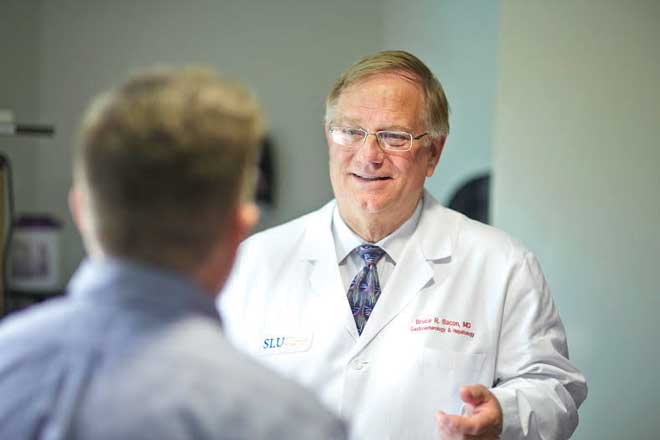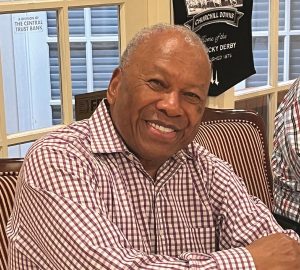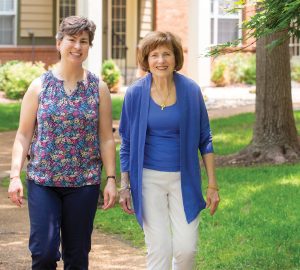Hepatitis C virus (HCV), transmitted via infected blood, is a stealth killer. Up to 80 percent of people who carry it show no symptoms until it’s too late. Left untreated, it can lead to chronic liver disease, cirrhosis, liver cancer and death. More than 15,000 people die every year from HCV-related issues.
Federal disease experts recommend screenings for baby boomers, the group most likely to be infected without knowing it. “But until recently, doctors didn’t have much to offer patients who tested positive,” says Dr. Bruce Bacon of SLUCare Physician Group, co-director of Saint Louis University Liver Center. “For years, the standard treatment was interferon injections coupled with an oral drug, administered several times daily for six months to a year. Side effects were severe, and the treatment worked only about 50 percent of the time.”
But thanks to research conducted at SLULC and other top centers, new drugs are stopping HCV in its tracks. The FDA recently approved a combination of two oral antivirals, Olysio and Sovaldi, that cures HCV in 90 percent of all cases, with no injections and no significant side effects. Last month, the FDA approved Harvoni, a once-daily, single-tablet regimen that is effective 95 percent of the time, and it’s expected to approve a similar drug, VieCura, next month. “These breakthrough therapies keep the virus from multiplying and nearly double the cure rate, in as little as eight to 12 weeks,” says Bacon, James F. King MD endowed chair in gastroenterology and professor of internal medicine at SLU School of Medicine. “They demonstrate substantial improvement over previous treatments for life-threatening diseases, giving us multiple effective options for beating the virus.”
SLU Liver Center, staffed by top SLU physicians and scientists, is a nationally recognized leader in life-saving research and treatment of liver disease, attracting thousands of patients annually from all over the country. One was 60-year-old Craig Tidball of Warsaw, Ind., a financial adviser at Edward Jones. “I found out I had HCV about 10 years after receiving a tainted blood transfusion during treatment for lymphoma,” he recalls. “By the time they discovered it, I had stage four liver scarring.”
Six months of standard treatment left him sick, weak and unable to work—and didn’t kill the virus. Then he read about Bacon’s work, and became one of the first to test a two-pill regimen of Olysio and Sovaldi. “I felt no side effects—I was able to work, and I even went skiing,” he recalls. “Best of all, for the first time in 15 years, I’m free of HCV. Thanks to Dr. Bacon and his team, I’ll live to play with my grandchildren.” There’s only one downside, he adds. “I feel so good, I’ve lost all my excuses. Now my wife makes me take out the trash!”
Bacon has cared for thousands of patients with HCV during his 30-year career, with varying results. “Now I can look people in the eyes and tell them they’re cured,” he says. “It’s phenomenal—and so rewarding.”
[Saint Louis University Liver Center, established in 2001, is committed to quality patient care, basic and clinical research, medical and public education, and prevention. Dr. Bruce Bacon of SLUCare Physician Group is co-director of Saint Louis University Liver Center and sees patients at SLU Doctors Office Building, 3660 Vista Ave. For more information, call 314.977.4440 or slucare.edu/sluliver.]
Pictured: Dr. Bruce Bacon
Photo courtesy of SLUCare Physician Group








